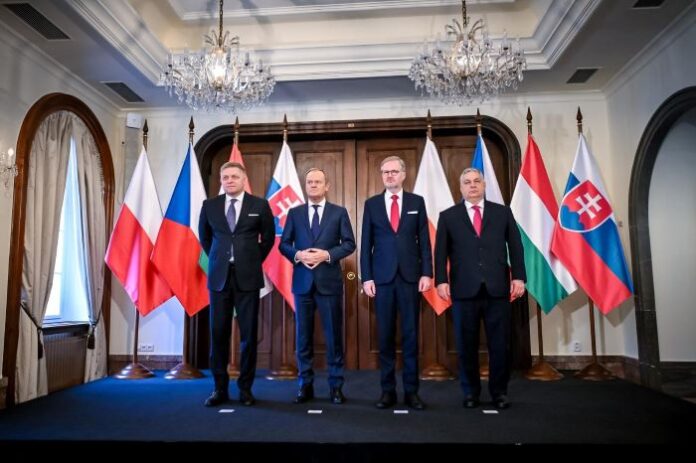Viktor Orbán made public his desire that his party, Fidesz, join the European Conservatives and Reformists (ECR) Group in the next European Parliament, whose leader is Italian Prime Minister Giorgia Meloni.
Brothers of Italy initially expressed an optimistic view. But, on the condition that the Hungarian prime minister change his favourable to Vladimir Putin’s position and accept ECR’s policy of solidarity with Ukraine.
It remains unclear how seriously Orbán advanced the ECR perspective, as this does not depend on him.
In a previous article, “Orbán’s Fidesz seeks for a group in the next European Parliament”, European Interest explained why several obstacles prevent such an alliance.
However, during the last three weeks, Orbán increased the gap between him and the ECR members. Thus, it is very probable that the doors of the ECR will be permanently closed to Fidesz.
ECR members don’t want to partner with Fidesz
The ECR Group supports Ukraine in line with the other big political families, the EPP, SDs, Reniew and the Greens, in promoting sanctions against Russia.
Orbán maintains close ties to Moscow and acts as Putin’s man inside the EU. He opposes the European financing package for Kyiv and considers the brutal invasion of Ukraine by Russia a “conflict between Slavs”. If the ECR Group accepts Fidesz, saving him from isolation will put its traditional position towards Ukraine and Russia at risk.
Moreover, several ECR members express their opposition to such a partnership.
Meloni seemed to be favourable but in some conditions.
Carlo Fidanza, an MEP of the Brothers of Italy party, told Reuters three weeks ago that ECR could accept Fidesz if it supports ECR’s Euro-Atlantic stance. MEP Roberts Zīle, a member of the National Alliance (LNNK) party in Latvia, a top figure in the ECR and a Parliament vice-president, expressed the exact position, adding that Orbán should change its views on Russia’s Ukraine aggression.
However, four members, the Czech Civic Democrats (ODS), the Sweden Democrats, the Flemish Nationalist NVA and Romania’s rising far-right party AUR, threaten to quit the ECR group if Fidesz joins it.
Orbán firmly closes ECR’s doors.
As Orbán became a pariah among the rest of the European leaders, he desperately needed allies within the EU. Although his views match more with those of the Identity and Democracy Group – which gathers together Marine Le Pen, Geert Wilders, and Matteo Salvini – he understands that partnering with them will lead to his total isolation in Europe.
ECR seemed an option, but only to Orbán’s mind.
Three events of the past few weeks demonstrated that he is unreliable and dangerous.
First: On Monday, February 26, Hungary’s National Assembly opened the spring session of Parliament. Opposition MP Bence Tordai, co-leader of the Green party “Dialogue”, asked the members of the Parliament to stand up for a minute of silence in memory of Alexei Navalny, the leader of the Russian opposition murdered by the Putin regime. In a disgraceful image, Orbán, his ministers and lawmakers from the Fidesz-led ruling coalition remained seated while the opposition representatives stood and remembered Alexei Navalny. Orbán thanked “government party groups for keeping their cool on the Navalny case”. Would Giorgia Meloni, also the president of the ECR, accept in his party family a party that denies giving due respect to the Russian opposition leader? After all, representatives of the ECR with EPP and S&Ds first issued a joint statement on February 16 concerning the death of the Russian opposition leader. Their statement was clear: “Vladimir Putin is responsible for the tragic fate of Alexei Navalny. One month before the presidential elections, the regime is silencing any voice of opposition. This is beyond any doubt.”
Second: On Tuesday, February 27, the informal central-European “Visegrad Four” (V4) Prime Ministers – the Czech Petr Fiala, the Polish Donald Tusk, the Slovak Robert Fico and the Hungarian Viktor Orbán – met in Prague for their annual summit. Petr Fiala, who hosted the summit, is also one of the most influential politicians within ECR.
The lousy atmosphere that marked the summit was caused mainly by Orbán’s statements. The Slovak Prime Minister Fico followed him on the same steps. Orbán deployed Putin’s narrative concerning the reasons for Russian aggression, refused to call Putin a war criminal and adopted the Russian position for a “diplomatic” solution. Thus, he explicitly made it clear that he could not sit side by side with the ECR leaders.
Third: A China-Hungary law enforcement summit, held in Budapest on Friday, February 16, led to agreements enabling Chinese police officials to patrol on Hungarian soil. On February 19, Hungary’s Prime Minister met China’s Minister of Public Security, praising the deep relations between the two countries. However, such agreements contradict Hungary’s obligations as an EU member state. China is increasing its control over Hungary when it officially holds the Presidency of the European Council for the second semester of 2024—noting that Italy – under the Meloni cabinet – and the Czech Republic – under the government of Fiala – distance themselves from Beijing recognising the threats the close ties with China represent.
So, how can Orbán and his party avoid total isolation at the next European Parliament?

